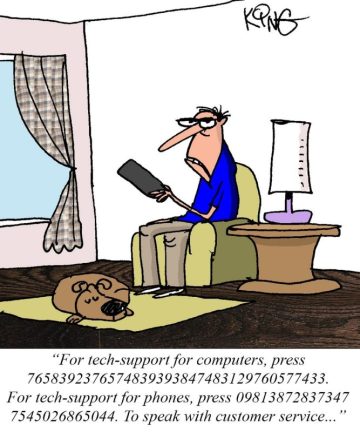State News
U.S. House votes to avert calamitous rail strike, but Senate prospects murky
The U.S. House moved Wednesday to avoid an economically disastrous nationwide rail strike, voting to codify an agreement that members of some unions had already rejected and separately add paid sick leave that workers had demanded.
The two-track approach allows Democrats to avert a strike that could cost the U.S. economy up to $2 billion per day while also acknowledging they sympathized with union members’ request for more sick leave.
Prospects in the Senate, where progressive stalwart Bernie Sanders, an independent from Vermont, and other members of the Democratic caucus have asked that sick leave be added to any deal imposed by Congress, remained murky Wednesday.
As the House votes closed Wednesday, Sanders was on the Senate floor urging support for the sick leave proposal.
“I hope very much that in a bipartisan way, we can do the right thing and tell the rail workers and tell every worker in America that the United States Congress is prepared to stand with them and not just the people on top who are doing extraordinarily well,” he said.
Several Republicans have also signaled their support for adding sick leave, but it’s unclear if there are the 10 Republicans needed to approve that measure.
The congressional action comes after President Joe Biden convened a panel of arbitrators to secure a deal between railroads and union leaders in September. That deal provided a 24% increase in total compensation to rail workers but did not affect sick leave policies that unions said were unworkable.
Four of the 12 rail unions declined to endorse the deal. They are legally able to strike on Dec. 9, though rail service is likely to be affected if a work stoppage is not avoided by the week’s end. Thousands of businesses would feel the impact in the weeks before the holidays.
Democrats say they must act
Biden, who fashioned himself “a proud pro-labor president,” said this week he would have preferred not to wade into the dispute but that the economic consequences necessitated federal action.
“I am reluctant to override the ratification procedures and the views of those who voted against the agreement,” he said. “But in this case — where the economic impact of a shutdown would hurt millions of other working people and families — I believe Congress must use its powers to adopt this deal.”
House Democrats took similar positions this week, appearing reluctant to approve a deal that unions had rejected but doing so anyway to avoid economic catastrophe.
“Congress has the authority to act,” U.S. Rep. Rick Larsen, a Washington Democrat who is a senior member of the House Transportation and Infrastructure Committee, said Wednesday. “Not because we want to, but we have to avoid a work stoppage. And we have to recognize that the tentative agreement falls well short of what is necessary for paid leave for rail workers.”
Republicans took the opportunity to blast Biden for failing to avert the rail shutdown with the September negotiation. Congress shouldn’t have to be involved, they said.
“Congress should be a last resort,” U.S. Sen. Joni Ernst, a Republican of Iowa, said. “Biden and this administration need to be more engaged in this. This is not our business. We shouldn’t be negotiating union contracts.”
U.S. Rep. Bob Good, a Republican from Virginia, tweeted early Wednesday afternoon before the House vote: “Republicans should not provide any votes for the Biden railroad bill. Doing so gives Democrats the chance to amend the deal and make it worse.”
Bipartisan vote
Wednesday’s 290-137 House vote to approve the tentative agreement — without added sick time — was bipartisan, with only eight Democrats voting against it and more than one-third of Republicans voting to approve it.
All of Virginia’s House delegation and Republican Rep. Morgan Griffith voted for the bill. Good, as well as Republican Reps. Ben Cline and Rob Wittman voted against it.
The vote to add the sick leave provision passed 221-207, mostly along party lines, with three Republicans — Don Bacon of Nebraska, Brian Fitzpatrick of Pennsylvania, and John Katko of New York — joining all House Democrats in voting to approve.
Avoiding a rail shutdown should be the priority, House Transportation and Infrastructure ranking Republican Sam Graves of Missouri said, not mollifying union members.
He said that Congress stepping in to override private negotiations and the recommendation of a neutral mediation board undermined future collective bargaining.
“It’s nothing more than a political stunt,” Graves said. “It’s pandering … Today, my colleagues are acting very recklessly and are setting a terrible precedent.”
U.S. Rep. Donald Payne, the New Jersey Democrat who chairs the panel’s rail subcommittee, responded that the proposal would only right the wrong of rail workers’ insufficient paid sick leave.
“This is not pandering,” Payne responded. “This is seeing a situation and addressing it.”
Uncertainty in Senate
After House passage, the measure will move to the Senate, where it’s unclear if the tentative agreement, the resolution with added sick time, or neither would pass.
The chamber will likely vote either Thursday or Friday.
Colorado’s John Hickenlooper was among the Senate Democrats joining Sanders in calling for seven days of added sick leave — the same amount required of federal contractors —to be included in a congressional resolution.
“Railroad companies are holding the American economy hostage over 56 annual hours of sick leave,” Hickenlooper said in a statement. “Just seven days. We can keep our economy humming, our supply chains open, AND treat workers with dignity. Any bill should include the SEVEN days of sick leave rail workers have asked for.”
Several Republicans gave varying levels of support to the prospect of adding sick leave to a bill. Ten would be needed to pass such a bill if every Democrat voted in favor. West Virginia Democrat Joe Manchin III, considered the caucus’ most conservative member, has not said how he would vote on the sick leave proposal.
Ernst said her party was “debating this heavily.”
But since Congress is involved, she said she would base her vote on the views of union members — not necessarily their leaders. Union leaders negotiated the September agreement that lacked all the sick time members sought.
Florida Republican Sens. Marco Rubio and Rick Scott said they wouldn’t vote for the tentative agreement that was opposed by workers.
Leaders of the Transportation Trades Department of the AFL-CIO, a major transportation union, on Wednesday morning prior to the vote endorsed the bill to add seven days of sick leave.
“Right now, every Member of Congress has an opportunity to be a champion of the working class,” TTD President Greg Regan and Secretary-Treasurer Shari Semelsberger said in a statement. “We implore these elected leaders to stand with essential workers who are the backbone of our nation’s supply chain. We urge the House and the Senate to vote in favor of guaranteeing seven days of paid sick leave to rail workers.”
In a statement, Biden thanked the House for passing its bill and called on the Senate to follow suit “immediately.”
“Without action this week, disruptions to our auto supply chains, our ability to move food to tables, and our ability to remove hazardous waste from gasoline refineries will begin,” he said. “The Senate must move quickly and send a bill to my desk for my signature immediately.”
$2 billion per day
The Association of American Railroads, the leading rail service providers trade group, estimated that a nationwide shutdown would mean daily losses of $2 billion for the U.S. economy.
According to a September AAR report, tens of thousands of businesses depend on rail to deliver goods, with 75,000 carloads beginning shipping every day.
The report said that other industries would not be able to replace rail transport. It would take 467,000 additional long-haul trucks to replace rail carriers.
There was unanimity among elected officials in Washington that a shutdown would be calamitous.
In a statement Monday, Biden called on Congress to approve the tentative agreement “to avert a potentially crippling national rail shutdown.”
“A shutdown is unacceptable,” White House press secretary Karine Jean-Pierre said at Monday’s press briefing. “It will hurt families, communities across the country. It will hurt jobs. It will hurt farms. It will hurt businesses.”
Transportation Secretary Pete Buttigieg also called Monday evening for Congress to adopt the agreement to prevent “a rail shutdown that would have devastating impacts on our economy.”
Democrats and Republicans in the House noted that a shutdown would worsen inflation, driving up energy and other costs.
And because of the complexity of the supply chain, any stoppage in service could take much longer to unfurl, Ed Mortimer, a former vice president for transportation and infrastructure at the U.S. Chamber of Commerce, said in an interview.
“Any type of disruption — it could only last a week, but it could take a month or two to get back to whatever normal was,” he said.
Jennifer Shutt contributed to this report.
by Jacob Fischler, Virginia Mercury
Virginia Mercury is part of States Newsroom, a network of news bureaus supported by grants and a coalition of donors as a 501c(3) public charity. Virginia Mercury maintains editorial independence. Contact Editor Sarah Vogelsong for questions: info@virginiamercury.com. Follow Virginia Mercury on Facebook and Twitter.
State News
Mountain Valley Pipeline Goes Into Service, Starts Delivering Gas in Virginia
Mountain Valley Pipeline, the 303-mile vessel that will deliver natural gas from the Appalachian region of West Virginia and Pennsylvania into Southwest Virginia, officially went into service Friday, after about a decade of steadfast opposition over concerns about environmental and community impacts in the areas in its path.
In a news release, the company said the project is now available to deliver natural gas with a capacity of up to 2 billion cubic feet of gas per day. Roanoke Gas said in a separate release Friday it had begun receiving the fossil fuel.
Diana Charletta, president and chief executive officer of Equitrans Midstream Corp, the pipeline’s developer, called the day an “important and long-awaited one,” for the country that will allow “greater access to an abundant supply of domestic natural gas for use as an affordable, reliable, and cleaner energy resource.”
The project was first announced in 2014 and planned to deliver natural gas from the Marcellus and Utica shale regions into Pittsylvania County, with an anticipated completion date in 2018.
But numerous legal challenges led the U.S. Fourth Circuit Court of Appeals to overturn state permits, finding some agencies failed to adequately ensure protections against sediment erosion and harm to endangered fish species, such as the candy darter.
In May 2023, however, Democratic West Virginia Sen. Joe Manchin included a measure in a federal stop-gap spending plan, the Fiscal Responsibility Act, that required all state and federal agencies to approve permits necessary for the project to be completed. The measure also prevented any legal challenges until it was completed.
With that greenlight, MVP resumed construction in August. The company requested final approval from the Federal Energy Regulatory Commission on Monday, stating that the project was “mechanically complete.”
On Tuesday, FERC granted the OK, after consultation with the Pipeline and Hazardous Materials Safety Administration revealed the agency “had no objections if Commission staff were to authorize in-service for the Mountain Valley Pipeline project.” MVP had entered into a consent agreement with PHMSA in October, because of conditions posing “an integrity risk to public safety, property or the environment.”
Terry L. Turpin, director of the FERC office that oversees the project stated that “Mountain Valley has adequately stabilized the areas disturbed by construction and that restoration and stabilization of the construction work are proceeding satisfactorily.”
The cost of the project, initially stated to be $3.5 billion in 2018, more than doubled to $7.85 billion, according to a news release earlier this year..
Scrutiny of the project, including the safety of coatings on the pipeline that laid out in the elements during years of delay and violations for preventing sediment erosion, increased in recent weeks as requests for the project to come online were submitted.
On Wednesday, when the pipeline’s activation was imminent, groups who have been advocating on behalf of indigenous people, other community members and the environment in West and Southwest Virginia raised their concerns and called for continued caution.
“I don’t know how else to express how angry, infuriated, grief stricken I am in this moment,” said Russell Chisholm, co-executive director of Protect our Water and Heritage Rights. The pipeline would have “repercussions …for everyone upstream in the fracking fields, and everyone downstream, where the gas is shipped and eventually burned, overheating our planet.”
Following a test failure on May 1, Appalachian Voices continuously submitted requests for information on inspection reports, in addition to the March 29 quarterly report that was most recently released, but received no response, said Jessica Sims, the group’s Virginia field coordinator.
The lack of response from PHMSA and FERC has left community members in the dark with little legal recourse to take action, Sims added, while condemning Manchin’s intervention at the federal level.
“The level of congressional interference with the project was unprecedented and certainly concerning as a reality that could happen again,” Sims said. “We remain deeply disappointed that one pet project was put on an unrelated debt bill and used to pressure members of congress on a matter they should not have been weighing in on in that way. That lack of separation of judicial and legislative powers is deeply concerning,” said Sims.
PHMSA officials said in response to questions over its transparency, that information for the public can be found on PHMSA’s website in an electronic reading room.
A PHMSA official said the law requires the agency to “consult and redact” information that’s sensitive or confidential.
“This process can take time. Nonetheless, PHMSA and its community liaisons have provided numerous briefings to the public directly, congressional offices, and to interested reporters on the matter.“
MVP will be required to conduct different testing within a year of operation and the agency is awaiting results on what caused the May test failure, the official added.
Virginia’s Department of Environmental Quality, “will continue to monitor the progress of final grading, stabilization, and restoration, which includes vegetation establishment,” an agency spokesperson stated Friday.
by Charlie Paullin, Virginia Mercury
Virginia Mercury is part of States Newsroom, a nonprofit news network supported by grants and a coalition of donors as a 501c(3) public charity. Virginia Mercury maintains editorial independence. Contact Editor Samantha Willis for questions: info@virginiamercury.com. Follow Virginia Mercury on Facebook and X.
State News
Virginia House and Senate Will Take Up Military Tuition Benefit on Different Days
For much of the past week, some Virginia political leaders have been conveying a message that the General Assembly will undo a recent policy change that angered military families.
At task force meeting, military families rip ‘ugly side of Virginia’s government’
But it became clear Thursday that the state Senate and House of Delegates haven’t agreed yet on a way out of the controversy surrounding the Virginia Military Survivors and Dependents Education Program. The program waives college tuition expenses for spouses and children of military members who were killed or severely disabled as a result of their service.
Senate leaders announced their chamber will return to Richmond on June 18, which is 10 days before the June 28 date the House had already selected. That schedule raises numerous logistical questions about what might happen if the two legislative chambers meet on different days to try to pass different bills on the same topic.
Participation in the VMSDEP program has spiked over the past five years, sparking concern among higher ed leaders that they were being asked to educate a growing number of students for free. The General Assembly’s attempt to reduce those costs by putting limits on the program has drawn fiery opposition from veterans’ groups. And the public pushback has forced political leaders into a difficult choice over whether to retreat or stand firm on the need to quickly address VMSDEP’s growing financial impact.
The recent revisions to the program impose a stricter Virginia residency requirement, prevents the waivers from being used for advanced degrees or a second undergraduate degree and requires participants to first pursue other forms of financial aid and only use VMSDEP for remaining costs.
In a news release, Senate Democrats indicated they won’t push for a complete repeal of recent changes limiting eligibility for VMSDEP benefits. They’ll instead pursue a partial rollback, which conflicts with the full repeal stance taken by Gov. Glenn Youngkin and House leaders.
“If we were to put it back in place there’d be a huge rush to sign up for the program,” Senate Majority Leader Scott Surovell, D-Fairfax, said in an interview Thursday. “And then we’re probably looking at a program that costs well over $100M that’s even harder to make adjustments to.”
In the release, Senate Finance and Appropriations Chair Louise Lucas, D-Portsmouth, noted that the budget containing the disputed VMSDEP overhaul passed with bipartisan support.
“We are committed to taking this necessary step to rectify unintended consequences as we continue to work together to conduct an independent review to find a long-term solution for VMSDEP,” Lucas said in the Senate Democrats’ release. “After my personal experience with massive resistance, I have dedicated my entire legislative career to ensure that everyone can access educational opportunities and reach their full potential. Our budget reflects this belief and the proposed changes reinforce my support for all students.”
The lack of agreement by the two General Assembly chambers, both of which are controlled by Democrats, could add more fuel to the controversy that erupted after the swift passage of an overdue state budget last month.
“The idea that Senator Lucas thinks it is acceptable to go rogue on this issue makes it clear she does not value veterans,” said Kayla Owen, a military spouse and co-founder of the Friends of VMSDEP advocacy group that’s been pressuring lawmakers to restore the program to the way it was before the budget passed.
Senate Democrats pointed to state data showing the program ballooning from 1,387 students in 2019 to 6,125 students in 2023, which has pushed the financial impact to an estimated $65.3 million per year.
That growth has sparked bipartisan concern, but leaders have struggled with how to balance sympathy for veterans with worries that the state has created an overly generous program that makes college virtually free for some families and more expensive for everyone else.
Virginia House speaker OK with special session to restore military tuition program
Advocates for military families have questioned that assertion and disputed the state’s cost estimates, arguing that adding up the amount of uncollected tuition isn’t necessarily an accurate metric for determining VMSDEP costs.
Democratic leaders in the Senate said the legislation they’ll introduce will ensure that anyone using VMSDEP to enroll in classes this fall won’t be impacted by the eligibility changes, exempt the families of veterans killed or wounded in combat with a 90% disability rating, require more guidance from the state on how to interpret the new rules and direct the Joint Legislative and Audit Review Commission to study VMSDEP prior to the 2025 General Assembly session.
That approach would keep some of the cost-cutting measures in place without erasing them all and starting over under a full repeal.
Pro-VMSDEP activists say that partial restoration of the program would exclude families impacted by post-traumatic stress disorder and service members who were killed or injured in training accidents or other non-combat scenarios.
It’s unclear how the House and Senate might resolve their differences, but the Senate going first could give the upper chamber more power to dictate the terms of what the VMSDEP fix will be. However, several Senate Democrats have expressed support for full repeal of the changes, casting uncertainty over whether caucus leadership would have the votes necessary to pass the bill described in Thursday’s release.
The House appears to be sticking with its plan for a full reversal of the VMSDEP changes. In a statement issued Thursday, House Appropriations Chairman Luke Torian, D-Prince William, said he’ll sponsor legislation “to restore the program to its previous form” as a task force convened by the governor works on longer-term policy recommendations. A full repeal bill sponsored by Torian and a bipartisan group of delegates who have worked on the issue was pre-filed Thursday.
“Veterans have many choices when deciding where to call home, and this program is a major reason why some families choose Virginia after their service,” Del. Jackie Glass, D-Norfolk, said in the release from Torian’s office. “I’ve heard from countless families in my district and throughout the Commonwealth about how these changes have disrupted their children’s lives and spouses’ efforts to further their education.”
The governor also indicated he still wants to see the VMSDEP changes completely reversed. In a social media post Thursday afternoon, Youngkin said “it’s time to come together and for the General Assembly to send me a clean bill that solely and fully repeals and reverses the eligibility changes made to VMSDEP.”
by Graham Moomaw, Virginia Mercury
Virginia Mercury is part of States Newsroom, a nonprofit news network supported by grants and a coalition of donors as a 501c(3) public charity. Virginia Mercury maintains editorial independence. Contact Editor Samantha Willis for questions: info@virginiamercury.com. Follow Virginia Mercury on Facebook and X.
State News
Election Workers Worry That Federal Threats Task Force Isn’t Enough to Keep Them Safe
Aiming to send a message, the Biden administration recently spotlighted its indictments and convictions in cases involving threats to election officials or workers.
But with no letup in reports of attacks, some elections professionals say federal law enforcement still isn’t doing enough to deter bad actors and ensure that those on the front lines of democracy are protected this fall.
“Election officials by and large have no confidence that if something were to happen to them, there would be any consequences,” said Amy Cohen, the executive director of the National Association of State Election Directors. “It is very clear that we are not seeing a deterrent effect.”
A U.S. Justice Department spokesman declined to comment for this story, instead directing States Newsroom to a webpage for the department’s Election Threats Task Force.
Launched by the Justice Department in 2021 in response to the wave of harassment of election officials that followed the 2020 election, the Election Threats Task Force works closely with local law enforcement and U.S. attorney’s offices around the country to investigate threats.
In going after those who make threats against election workers, the Justice Department is honoring a foundational purpose: The department was created in 1870 in part to protect the voting rights of southern Blacks during Reconstruction.
Run by John Keller, a top official in the Justice Department’s Public Integrity Section, the task force also includes the Criminal Division’s Computer Crime and Intellectual Property Section, the Civil Rights Division, the National Security Division, and the FBI. It also works with several other government agencies, including the U.S. Postal Inspection Service and the Department of Homeland Security.
Since its launch, the task force has brought charges in 17 cases, according to the department’s tally. Eight cases have resulted in prison time, with sentencing scheduled in several more.
In one case, brought in Nevada, the defendant was acquitted.
In March, a Massachusetts man received a three-and-a-half-year sentence — the longest won by the task force to date — for sending an online message to an Arizona election official warning her a bomb would be detonated “in her personal space” unless she resigned.
A Texas man received the same sentence last August for posting threatening messages targeting two Maricopa County, Arizona officials and their families, and separately calling for a “mass shooting of poll workers” in precincts with “suspect results.”
‘Each of these cases should serve as a warning’
Attorney General Merrick Garland highlighted these convictions and others in a May 13 speech at a task force meeting.
“Each of these cases should serve as a warning,” declared Garland. “If you threaten to harm or kill an election worker, volunteer, or official, the Justice Department will find you. And we will hold you accountable.”
But those prosecutions amount to only a tiny share of what the Justice Department has said is over 2,000 reports of threats or harassment submitted by the election community to the FBI since the task force was launched in 2021. Around 100 of those were investigated, according to the Justice Department.
The small number of investigations and prosecutions is largely due to free speech concerns. Legal experts say that anything short of a direct and explicit threat to cause physical harm may well be protected speech under the First Amendment.
“A true threat is a serious expression of an intent to commit an act of unlawful violence,” Keller has said. “If they don’t cross that line into invoking violence, they are generally not going to constitute a criminally prosecutable threat.”

Still, as the 2024 vote approaches, there’s little evidence that the volume of attacks against the people who run elections has declined, or that election workers feel safer.
A recent Brennan Center survey found that more than half of local election officials said they were concerned about the safety of their colleagues or staff — around the same number as in 2022, the year of the last federal election. Around a quarter worry about being assaulted at home or at work.
“This is a widespread issue in the elections community,” said Tammy Patrick, the CEO for programs for the National Association of Election Officials, and a former election official in Maricopa County. “It’s happening all across the country. It’s not just a question of it being in swing states, or just being in the city or whatever. It’s happening in a way that is a concerted campaign to create and sow chaos.”
“There is some feeling that the task force is a political tool,” said another election expert, “that allows the administration to say they care and they’re doing something.”
Troubling episodes but little followup
In March 2022, anti-fraud activists, accompanied by the local GOP chair, showed up at the office of Michella Huff, the election director for Surry County, North Carolina.
Huff said the activists tried to pressure her to give them access to county voting machines, citing what they said were flawed voter rolls. The group repeatedly threatened to have Huff ousted from her job if she didn’t cooperate, and said they planned to return with the local sheriff, though they did not do so.
Huff declined to provide access to the machines, and reported the episode to the state election board’s investigations unit.
A spokesperson for the board did not respond to an inquiry about whether the report was forwarded to federal law enforcement.
Election security advocates have urged the FBI to do more to probe efforts by supporters of former President Donald Trump to gain access to voting machines in other states, warning that the breaches could have allowed for voting machine software to be compromised.
Huff said she never heard from law enforcement on any level, despite speaking publicly about the episode.
Though Huff wasn’t physically threatened, she said she’d still like to have seen federal authorities do more to respond.
“If it is truly a threat, I think every threat needs to be looked at serious(ly), and it needs to be considered as to what the intent was, if it was successful, and what the repercussions would be if it had been successful,” said Huff. “A threat is a threat.”
More overt efforts to physically intimidate election workers also have at times spurred little law enforcement followup.
The night before South Carolina’s 2022 primaries, a Republican candidate who has promoted lies about the 2020 election posted a message on the conservative social media site Telegram, to a group of anti-fraud activists.
“For all of you on the team tomorrow observing the polls, Good Hunting,” the message said. “We have the enemy on their back foot, press the attack. Forward.”
During the voting period, groups of activists showed up at multiple polling places to verbally harass, photograph, and film election workers as they did their jobs, recounted Aaron Cramer, the executive director of the Charleston County Board of Voter Registration and Elections.
The activists called the police to at least one polling site, falsely alleging evidence of fraud by election staff. The police came, but made no arrests — though the episode left the site’s lead poll manager shaken, Cramer said.
Cramer said his office provided detailed reports on both the Telegram message and the harassment at polling sites to the Department of Homeland Security, as well as to the state election commission.
“We took that threat pretty seriously,” he said, referring to the Telegram message.
He said he received a response from DHS saying the report was being looked into, but heard nothing after that.
“I don’t know what the conclusions were, or what occurred after submitting that information,” Cramer said.
But Cramer added that the experience produced a successful effort to increase collaboration with local, state, and federal authorities — with the result that the county is much better prepared to respond to, and anticipate, similar incidents this year.
“When you’re on the defense, you’re kind of reacting to everything, and I think that’s how the past was,” said Cramer. “And now we’re being proactive.”
‘I dread November for you guys’
Patrick, of the National Association of Election Officials, said that while she understands the need to avoid running afoul of the First Amendment, authorities must balance legitimate free speech concerns with their urgent duty to protect those conducting elections.
And, she suggested, they may not always be getting that balance right.
“We need to be really careful that we’re not allowing people to yell fire in a crowded theater,” Patrick said. “And that we’re not allowing people to use what they are potentially claiming as their freedom of speech as a way of creating chaos in a system, or to threaten individuals who are just trying to do their job.”
In addition, election professionals say they’ve complained for years that after they submit reports about threats and harassment to the FBI, there’s often a lack of follow-up beyond an acknowledgment of receipt.
Of course, law enforcement frequently can’t share details about their work, even with those who were targeted, in order not to compromise an investigation. But Patrick said even basic information could be helpful.
“Even letting them know that the report is being worked, so it doesn’t just go into the void, and a victim knows there’s going to be a knock-and-talk, gives the individual who made that report some sense of closure,” Patrick said, referring to when federal agents show up to speak with a suspect at their home.
The problem may be exacerbated by a lack of understanding among some in the elections world about what federal law enforcement can and can’t do. Many election officials, said Cohen, of the National Association of State Election Directors, want front-end help with steps like bolstering physical security to better prepare for incidents.
“Law enforcement, and especially federal law enforcement, is only coming at the back end,” said Cohen. “Their goal is not prevention or recovery, their goal is prosecution. And it has taken our community, I think, a long time to understand what we should be expecting from DoJ.”
Ultimately, said Cohen, the prosecutions brought by the Justice Department appear to have done little to reduce the number of threats election workers are subject to today.
“I’m really grateful that DOJ has secured convictions in Arizona,” said Cohen. “But I don’t think securing convictions in Arizona three years later has actually deterred anything in Arizona.”
Indeed, Arizona has been a hotbed for election misinformation, and its election officials continue to be targeted by a consistent stream of threats, according to multiple reports.
Huff, the county election director in North Carolina, said that with a major election approaching, members of the public often express sympathy for her and her staff — an acknowledgement that the vitriol they’ve been facing is only likely to get stronger.
“Out in public, I get that,” Huff said — ‘Boy, I dread November for you guys.’”
by Zachary Roth, Virginia Mercury
Virginia Mercury is part of States Newsroom, a nonprofit news network supported by grants and a coalition of donors as a 501c(3) public charity. Virginia Mercury maintains editorial independence. Contact Editor Samantha Willis for questions: info@virginiamercury.com. Follow Virginia Mercury on Facebook and Twitter.
State News
Virginia NAACP Sues Shenandoah School Board After District Restored Confederate Names
The Virginia NAACP on Tuesday filed a lawsuit against the Shenandoah County School Board for what it called “reaffirming discrimination” after the school system voted to rebrand schools with Confederate names in May.
The lawsuit alleges that the school board violated the U.S. Constitution, Title VI of the Civil Rights Act of 1964 and the Equal Educational Opportunity Act. The plaintiffs seek to remove the Confederate names, mascots and vestiges, and to prevent any future school naming involving Confederate leaders or references to the Confederacy.
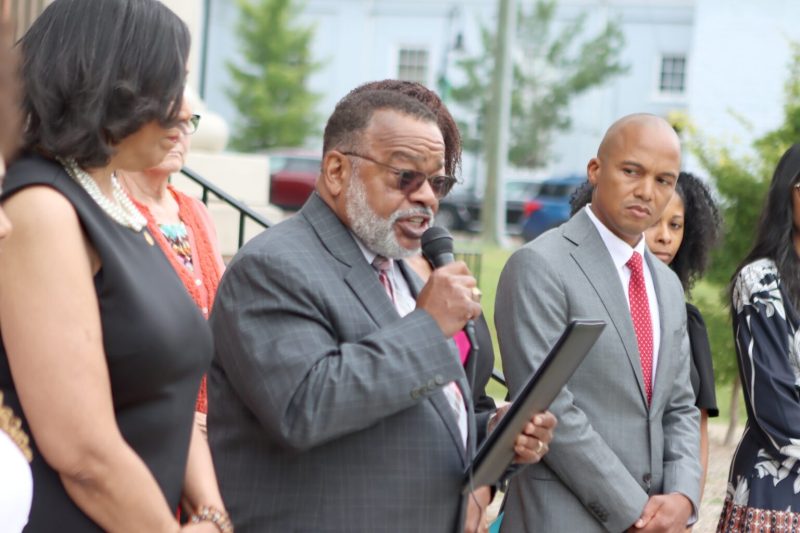
Virginia NAACP President Cozy Bailey speaking to a crowd in front of the Shenandoah County Circuit Court on June 11, 2024. (Nathaniel Cline/Virginia Mercury)
On May 10, the Shenandoah County School Board reversed a 2020 decision by a previous board to rename two schools after Confederate Generals Turner Ashby, Robert E. Lee and Thomas “Stonewall” Jackson. In 2021, the schools on the division’s southern campus, which included North Fork Middle, were renamed from Stonewall Jackson High School to Mountain View, and Ashby-Lee Elementary School to Honey Run.
Shenandoah County Public Schools responded to a request for comment, but did not immediately provide remarks.
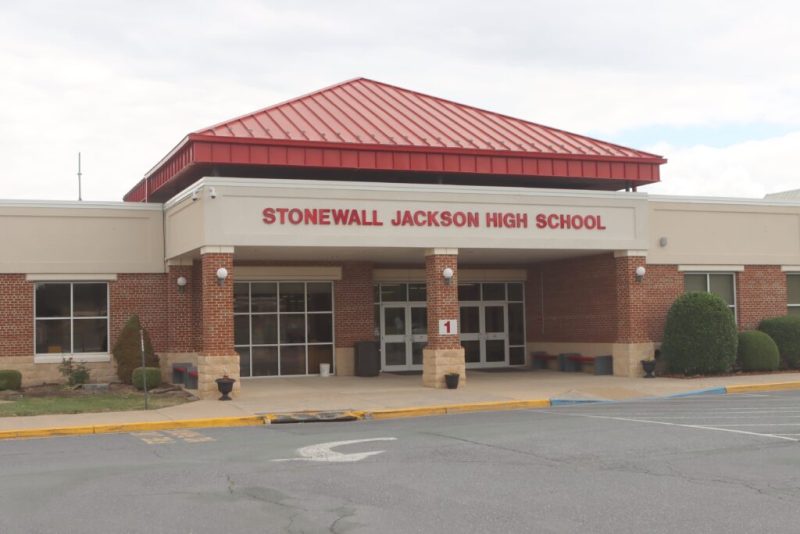
A view from outside Stonewall Jackson High School in Shenandoah County. (Nathaniel Cline/Virginia Mercury)
“This backward move has received a negative reaction all over the world, and the world is watching to see if this variety of the seeds of hate and disenfranchisement will take root and return Shenandoah County and the Commonwealth of Virginia to the days when racial exclusion was the law of the land,” said Rev. Cozy Bailey, president of the Virginia NAACP.
On Tuesday, Bailey, members of the state NAACP and their attorneys gathered with about 45 community members and students in front of the Shenandoah County Circuit Court to announce the legal action against the school board’s decision to restore Confederate names to the schools. It appears to be the first school district in the country to do so.
Bailey described the board’s decision on May 10 as “cold-hearted” and reminiscent of the Jim Crow era. He said the organization is not trying to revise history, but is “chartering” a better path for the future by learning from the past and not making the same mistakes.
Some people, including a portion of Shenandoah residents who support the school names reversal, believe the Confederacy represents a heritage of Southerners’ courage against the federal Union while fighting for the rights of southern states. Others, including civil rights groups and some Shenandoah students and families, view the Confederacy as defenders of slavery and a foundational part of America’s history of racism.
Between the 1950s and 1960s, local leaders in Shenandoah County named public schools after Confederate leaders.
Since that time, a movement to make schools more inclusive and equitable has advanced in courtrooms and through legislation at the state and federal levels. In recent years, localities statewide have made a concerted effort to address the commonwealth’s history of white supremacist ideology and historical practices of creating unfair advantages for white people by implementing policy changes and hosting community discussions on these topics.
Several Virginia communities renamed roads that bore the names of people connected to slavery and removed signs and symbols of the Confederacy, such as statues.
Attorneys from the Washington Lawyers’ Committee and Covington & Burling LLP are representing the plaintiffs — the NAACP and five current students in Shenandoah County Public Schools.
Marja Plater, senior counsel with the Washington Lawyers’ Committee for Civil Rights and Urban Affairs, said the Confederate generals believed deeply and fought to preserve the ideology of white supremacy.
“It is what these men are known for,” Plater said. “Honoring them is to honor the legacy of discrimination.”
According to Ashley Joyner Chavous, an attorney with Covington & Burling, the community was involved early in the process of pushing back against the renamed schools, before the legal team received assistance from families in the community and their “brave” children who stepped up to share their perspectives.
“We’ve only come to learn more, and we look forward to engaging with the community as we proceed in this meditation,” Chavous said.
The lawsuit was filed Tuesday in the Western District Court of Virginia in Harrisonburg. A judge and court date have not been set.
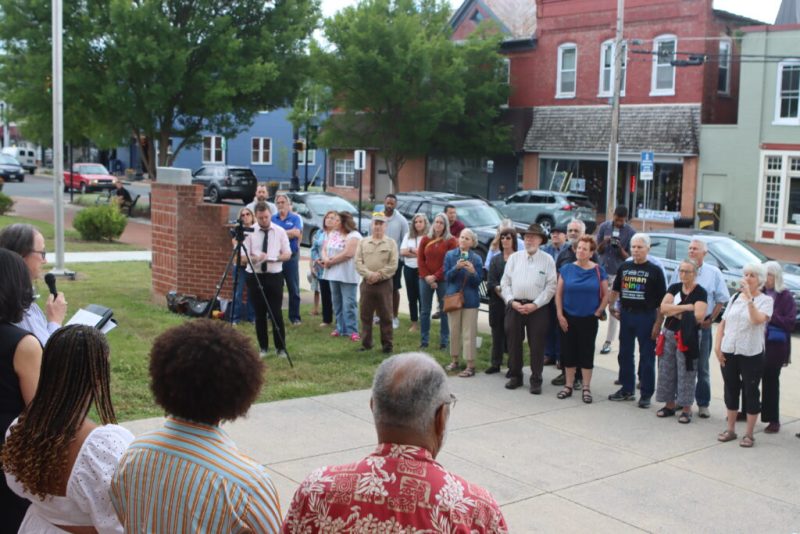
A crowd gathers in front of the Shenandoah County Circuit Court on June 11, 2024 after the Virginia NAACP announced it has filed a lawsuit against the Shenandoah County School Board for allegedly “reaffirming discrimination” when it voted to return the original Confederate school names on May 10. (Nathaniel Cline/Virginia Mercury)
by Nathaniel Cline, Virginia Mercury
Virginia Mercury is part of States Newsroom, a nonprofit news network supported by grants and a coalition of donors as a 501c(3) public charity. Virginia Mercury maintains editorial independence. Contact Editor Samantha Willis for questions: info@virginiamercury.com. Follow Virginia Mercury on Facebook and Twitter.
State News
Governor Glenn Youngkin Dedicates Culpeper Battlefields State Park
Governor Glenn Youngkin officially dedicated Virginia’s newest State Park, Culpeper Battlefields State Park, on June 8, 2024. The park opens with 263 acres centered around Fleetwood Hill at Brandy Station Battlefield, the site of the largest cavalry battle fought on the North American continent.

Governor Glenn Youngkin attends the dedication of Culpeper Battlefields State Park on June 8, 2024. Official Photo by Christian Martinez, Office of Governor Glenn Youngkin.
Culpeper Battlefields State Park is Virginia’s 43rd State Park and will expand to 2,200 acres by December 2027 through a series of property transfers. This park preserves parts of four major Civil War battles fought in Culpeper County: Brandy Station, Cedar Mountain, Kelly’s Ford, and Rappahannock Station.
“Virginia’s 43rd state park stands as a powerful reminder of our nation’s history and the importance of preserving that history for future generations,” said Governor Glenn Youngkin. “Culpeper Battlefields State Park connects us to our past and inspires us as we march together into our future. Visitors from all over will be able to appreciate the beauty of nature and reflect on the enduring spirit of resilience and unity that defines us.”
The land, largely open to the public, includes trails and interpretive signs maintained by the American Battlefield Trust, Brandy Station Foundation, and the Cedar Mountain Battlefield. Preservationists have long sought to protect these landscapes from development, and establishing this state park ensures their protection for future generations.
“The addition of this property to Virginia’s State Parks will ensure this land will remain available to the public and protected for future generations,” said Secretary of Natural and Historic Resources Travis Voyles. “The dedication of Culpeper Battlefields State Park stands as a symbol of our administration’s commitment to providing new opportunities for Virginians to recreate outdoors while preserving the Commonwealth’s cultural heritage and natural beauty.”
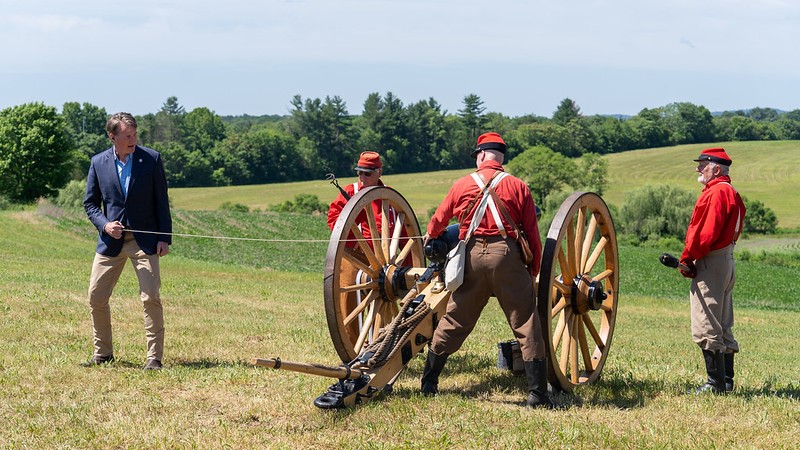
Governor Glenn Youngkin attends the dedication of Culpeper Battlefields State Park on June 8, 2024. Official Photo by Christian Martinez, Office of Governor Glenn Youngkin.
“This dedication celebrates a preservation process decades in the making,” said American Battlefield Trust President David Duncan. “It is an honor to come together with so many outstanding partners at the culmination of much work over long years to safeguard these historic landscapes.”
The park is being created from land donated by the Trust and its partners, who have been acquiring battlefield lands in Culpeper County since 1997. Legislation to establish the park was approved by the Virginia General Assembly in June 2022 and signed by the governor. Additional appropriations will allow the acquisition of up to 800 more acres to expand and enhance the park.
“The dedication marks the culmination of years of effort to bring forth our newest State Park,” said Senator Bryce Reeves. “For decades, the Brandy Station Foundation, Cedar Mountain Battlefield, and others have worked to preserve and protect these sites, which we dedicate as the Culpeper Battlefields State Park. It is right that we honor the fallen on both sides, all Americans, who fought here and consecrated this ground.”
“Within comfortable commuting distance of Washington, D.C., and situated in the heart of the breathtaking Virginia Piedmont, the new park will serve as a principal link in our region’s storied chain of historical, cultural, and recreational sites,” said Paige Read, Director of Culpeper tourism and town economic development.
“This park is now open thanks to our partnership with the American Battlefield Trust and so many within the Culpeper community,” said Matt Wells, Director of the Virginia Department of Conservation and Recreation, which manages Virginia State Parks. “As we move forward, we will continue to engage partners and stakeholders in the planning process. A master plan will be developed with input from our communities, and together, we will chart the best possible road map for this new park.”
“Virginia State Parks play an important role in connecting the community to these wonderful outdoor recreation and historic spaces,” said Dr. Melissa Baker, Director of Virginia State Parks. “We’re proud to expand that great legacy with the dedication of Virginia’s newest State Park, Culpeper Battlefields State Park.”
Visitors to the park can explore its history through interpretive walking and equestrian trails, along with guided tours available through mobile apps. Future recreational activities may include access to the Rappahannock River, camping, and public programming.
This park is under development and limited parking, so guests are encouraged to check the Culpeper Battlefields State Park webpage at www.virginiastateparks.gov before visiting.
State News
At Task Force Meeting, Military Families Rip ‘Ugly Side of Virginia’s Government’
Kristen Fenty of Virginia Beach says her daughter Lauren only got one moment of physical proximity to the father she never got a chance to know. It happened when she was a baby, still small enough to be lifted onto her father’s casket.

The first meeting of the Preserving Virginia Military Survivors and Dependents Education Program Task Force drew a sizable crowd to the Virginia War Memorial. (Graham Moomaw/Virginia Mercury)
As a room full of government officials listened Monday, Fenty told the group that her daughter — who was 28 days old in 2006 when her dad, Lt. Col. Joe Fenty, was killed in a helicopter crash — is now 18, preparing to go to college and hoping to eventually go to medical school.
But a tuition waiver program Fenty assumed would help pay for her daughter’s education, the Virginia Military Survivors and Dependents Education Program, has been thrown into limbo due to state leaders’ controversial efforts to cut the program’s growing costs.
“Societies that do not share the cost of war topple,” Fenty said, adding that she hopes the Virginia General Assembly will “right this wrong.”
At the first meeting of a bipartisan task force Gov. Glenn Youngkin convened to study the VMSDEP program and its growing financial impact on Virginia’s public higher education system, Youngkin administration officials and General Assembly members said they were committed to listening to military families and see their well-being as a top policy priority. Fenty was one of several military spouses and veterans selected to serve on the task force, which she called “both an honor and an agony.”
Over the course of several hours Monday afternoon at the Virginia War Memorial building in Richmond, public officials mostly took a rhetorical beating from military veterans and Gold Star spouses who said they felt betrayed by an insular, out-of-touch political class.
“These past two months have shown me the ugly side of Virginia’s government,” said task force member Donna Lewis, a mother of three whose husband was killed in combat in Iraq. “Countless senators and delegates we met with said they were told the impact on our families would be minimal.”
Lewis said she hoped the task force would be productive, but was skeptical after watching what she called “institutional betrayal in its highest form.”
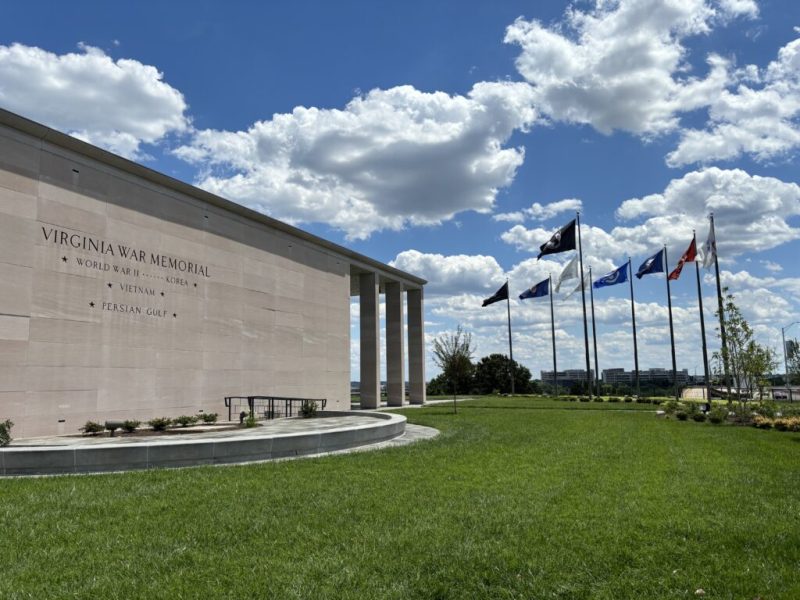
The Virginia War Memorial in Richmond. (Graham Moomaw/Virginia Mercury)
General Assembly leaders have pointed to data showing the VMSDEP program, which provides tuition waivers to spouses and children of military members killed or permanently disabled as a result of their service, has grown exponentially over the last five years. With VMSDEP beneficiaries essentially given the opportunity to go to college for free, some Virginia universities have raised concerns that they can’t continue absorbing the costs of enrolling a growing number of VMSDEP beneficiaries that don’t pay tuition. Those added costs, some policymakers have argued, will ultimately be felt by taxpayers at large or by tuition-paying students who might have less ability to pay than families receiving military benefits.
According to data presented by state officials, VMSDEP participation has grown by nearly 350% over the last five years, jumping from 1,400 students in 2019 to 6,400 in 2023.
The revised program imposes a stricter Virginia residency requirement, prevents the waivers from being used for advanced degrees or a second undergraduate degree and requires participants to first pursue other forms of financial aid and only use VMSDEP for remaining costs.
The attempted trimming of the program enraged military veterans and their families, who have bristled at the idea they’re becoming a burden on public universities that they say don’t seem particularly hard up for cash. Supporters of the VMSDEP program also contend it’s a benefit earned through the sacrifices of adults and children alike and shouldn’t be tied to a family’s ability to pay like other forms of financial aid. Policymakers’ attempts to shield current VMSDEP beneficiaries from the changes fell short, the critics argue, by being unclear and leaving many families uncertain about their status.
The General Assembly is already planning to reconvene later this month to undo the changes to the VMSDEP program and take a closer look at its eligibility rules and how they could be reformed. The task force, made up of General Assembly members, cabinet officials, higher education officials, veteran services officials and military families themselves, is supposed to be studying VMSDEP and issuing recommendations for the 2025 legislative session.
“You have made numbers come alive,” Youngkin Secretary of Education Aimee Guidera told the crowd at the conclusion of Monday’s meeting. “And that’s what matters. And it’s emotional.”
House of Delegates leaders have specified their chamber will return on June 28 and intend to fully reverse the VMSDEP changes. Speaking with reporters after Monday’s meeting, House Appropriations Chairman Luke Torian, D-Prince William, said he and others who supported the VMSDEP changes had sincere concerns about the program’s growth and were trying to look out for the state’s best interests.
“Obviously, from what we’re hearing, it went sideways,” Torian said. “We’re going to move forward. We’re going to address the concerns.”
The plan for the state Senate is less clear, but Senate Majority Leader Scott Surovell, D-Fairfax, said the Senate expects to announce more detail later this week.
Senate Finance and Appropriations Chair Louise Lucas, D-Portsmouth, attended Monday’s task force meeting virtually and gave only brief introductory remarks.
“There is no stronger supporter of our military families than I am,” said Lucas.
The task force was part of Youngkin’s response to a furor that erupted when the VMSDEP changes were included in a bipartisan budget deal approved on May 13. Though changes to VMSDEP were on the table in the General Assembly’s regular session, the final budget deal was mostly crafted behind closed doors and approved quickly.
At the time, both parties were eager to get the overdue budget done and avert the prospect of a government shutdown come July 1. But Youngkin, who signed the budget, and the General Assembly, which passed it by a wide margin, are now under pressure to come back before July 1 to reverse the VMSDEP changes and restore the program to its former state.
The task force’s first meeting mostly focused on introductions and taking public comment, almost all of which was infused with indignation at the officials listening from the other side of the table.
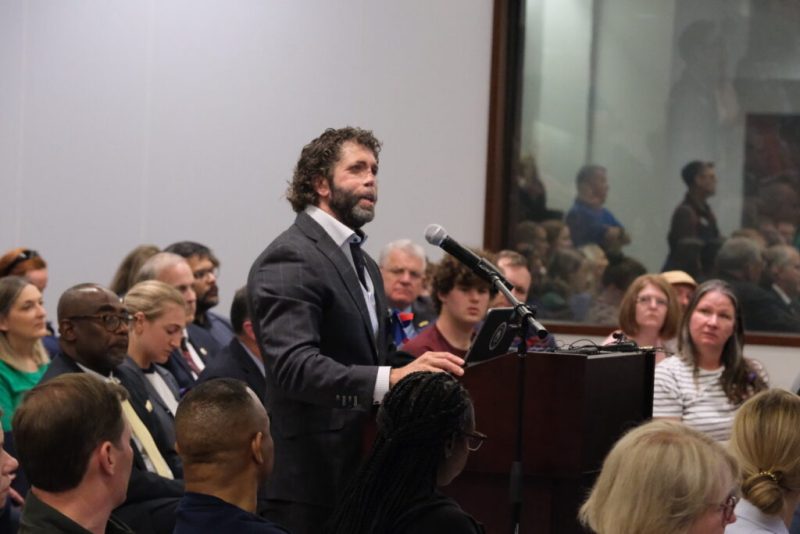
Former U.S. Navy Seal Jason Redman, who was wounded in Iraq, criticized Virginia officials for what he described as backtracking on commitments to military veterans and their families. (Graham Moomaw/Virginia Mercury)
Jason Redman, a former U.S. Navy Seal and Old Dominion University graduate who was badly wounded in Iraq, said people signing up for military service are given assurances that, if the worst happens, their loved ones will be taken care of.
“You’re saying that it is too hard to sustain this program to families that have buried a loved one for your freedom,” Redman said. “To warriors who have endured loss of limb, eyesight, function, disfigurement and permanent disability. … This is appalling.”
Brian Smith, a military veteran who said he now works as an eighth grade civics teacher, said that during his service he could never make promises to his daughter that he would be there for any particular holiday or birthday. Expecting VMSDEP to cover college costs, he said, was a promise he thought could be kept.
“What lesson am I taking back to my eighth graders about government?,” he said. “Can you help me out with that?”
by Graham Moomaw, Virginia Mercury
Virginia Mercury is part of States Newsroom, a nonprofit news network supported by grants and a coalition of donors as a 501c(3) public charity. Virginia Mercury maintains editorial independence. Contact Editor Samantha Willis for questions: info@virginiamercury.com. Follow Virginia Mercury on Facebook and Twitter.











